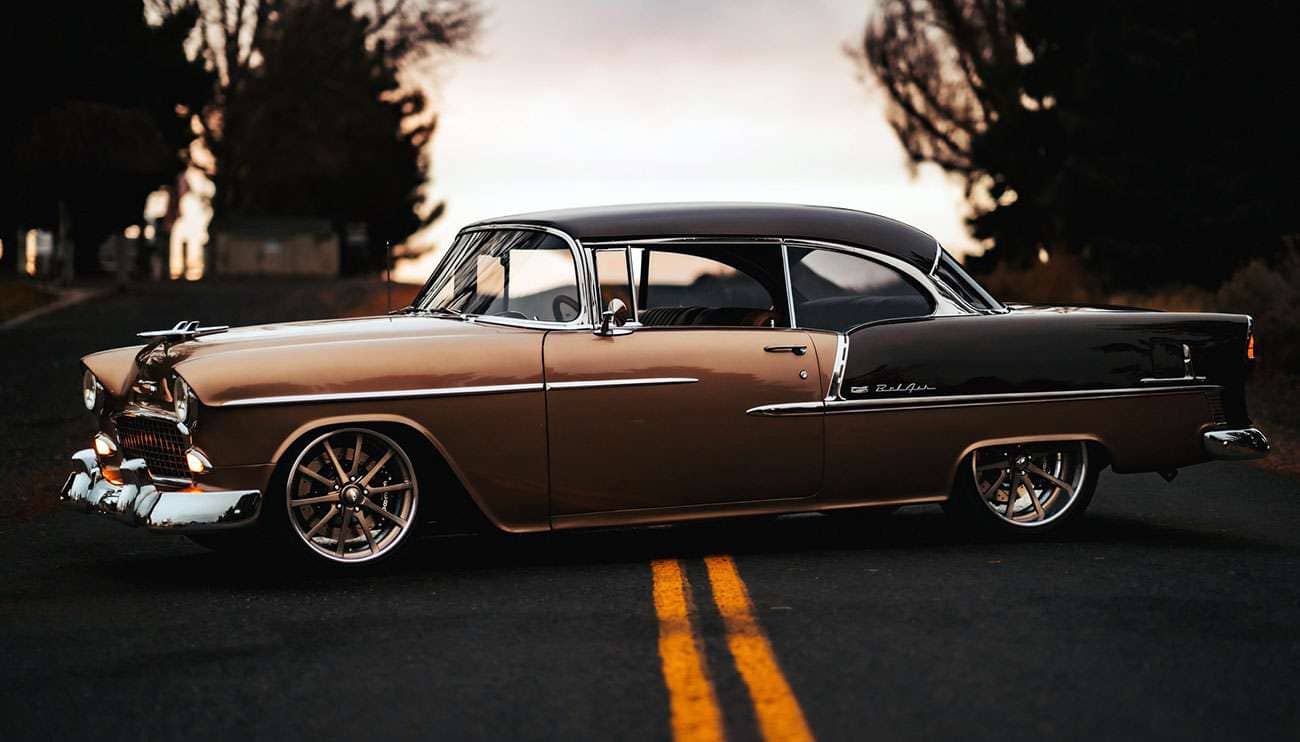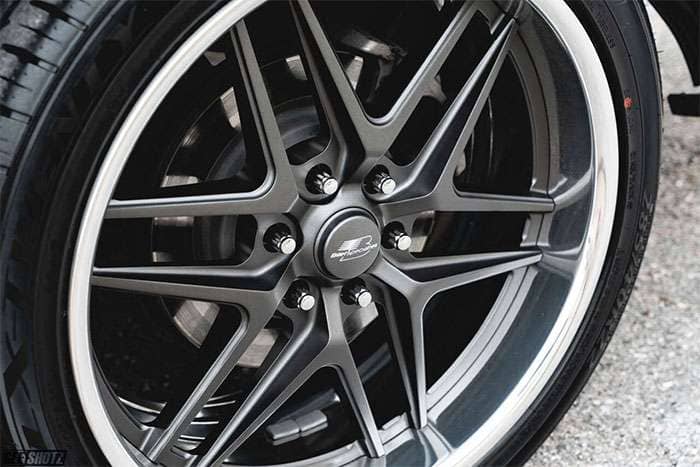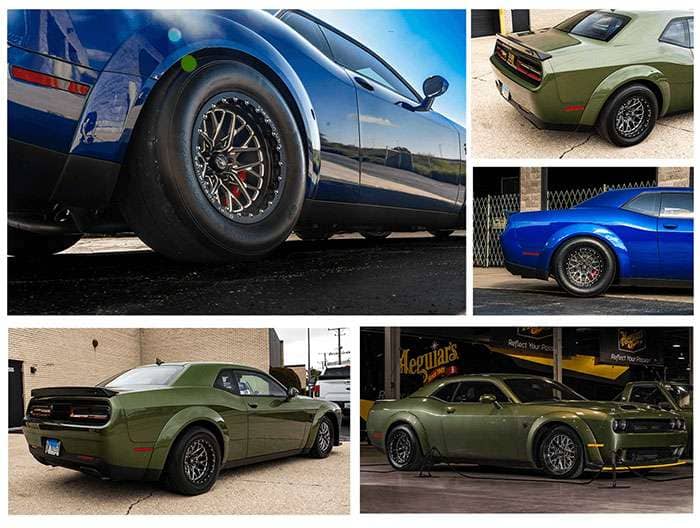
Custom wheels come in countless designs, from vintage 1928 Ford Model A styles to modern 2017 configurations. Billet Specialties wheels stand out as premium options that deliver real performance advantages for serious car enthusiasts. These high-quality wheels offer significant weight savings, with some models weighing just a quarter of what stock wheels do.
Two-piece Billet Specialties wheels provide superior versatility compared to one-piece designs. The construction allows the center to be welded at different positions within the outer rim, creating perfect fitment for virtually any vehicle. While these wheels cost more due to their forged centers, they're proudly manufactured in the United States.
When you order Billet Specialties wheels, you get expert fitment advice tailored to your specific vehicle. The typical six-week wait time reflects the custom manufacturing process, but most owners agree the results justify the patience. Their fitment visualization tools eliminate guesswork from the selection process, so you can choose with confidence.

Billet Specialties has built a reputation for American craftsmanship since 1985. The company pioneered wheel designs that combine strength with striking appearance, setting them apart in the custom wheel market.
Understanding the manufacturing process explains why billet wheels perform differently than cast alternatives. Cast wheels are created by pouring molten aluminum into molds, while billet wheels are machined from solid aluminum stock. This stock contains a natural grain structure resembling fibers in a wire strand, creating strength without adding weight. The Street Lite wheel demonstrates this advantage, weighing only 14.5 pounds.
Most Billet Specialties wheels use rotary-forged centers with traditional rim shells, or for smaller sizes, are constructed from a single piece of rotary-forged billet. The manufacturing precision shows in the details – soft, flowing spoke contours rather than straight-cut patterns.
While many competitors outsource production overseas, Billet Specialties manufactures 100% of their wheels in America. They maintain domestic production despite the cost advantages of offshore manufacturing. As founder Glenn Grozich explains, "I know I can have my products made for a fraction of the cost off-shore, but I feel like we'd be selling ourselves short at that point as Americans".
Their entire production process happens under one roof – from initial design through CNC machining to final polishing. This integrated approach ensures consistent quality control throughout manufacturing.
Glenn Grozich founded Billet Specialties in 1985, bringing manufacturing expertise learned alongside his father. His philosophy prioritizes craftsmanship over profit maximization. "If my business was run by accountants, this product line wouldn't be half the size it is. That's because many products we make are put out because of my passion," Grozich notes. This commitment extends throughout their operations, where even entry-level wheels receive the same meticulous finishing as premium models.

Image Source: Drag Racing Wheels
Selecting the right wheel construction affects both your vehicle's performance and your build's overall success. Understanding the key differences helps you make the best choice for your specific project.
One-piece wheels represent the most common design on today's roads, formed from a single piece of metal. Two-piece wheels use separate components: the barrel (outer rim) and the face (center with spokes). Billet Specialties introduced their innovative two-piece design in 1990, building on their groundbreaking three-piece wheels from 1989.
The manufacturing process for Billet Specialties' two-piece wheels involves rotary-forged 6061 T6 aluminum centers compressed under tremendous pressure—over 4,000 tons of force at 300 rpm. This compression rearranges the aluminum's grain structure into a circular pattern, creating stronger wheel centers. The components are then welded together 360 degrees, establishing exceptional structural integrity.
Two-piece wheels excel in customization flexibility. While one-piece wheels come with fixed dimensions, two-piece designs allow custom sizes, widths, backspacing and finishes. This adaptability makes them perfect for extensively modified vehicles.
Proper installation requires attention to brake clearance. Wheels with backspacing of 4.50" or more need brake clearance verification. The measurement from your axle center to the top of the caliper cannot exceed 6-9/16" (6.5625"). Billet Specialties offers specialized 15X10 barrels designed specifically for F-Body Camaros and Fox body Mustangs, eliminating the need for alternative brake systems.
Manufacturing processes create significant strength differences between cast and billet wheels. Cast wheels, formed by pouring molten aluminum into molds, may develop microscopic voids and inclusions that compromise structural integrity. Modern casting techniques minimize these issues, but billet components maintain superior strength properties throughout production.
The technical specifications tell the story: 6061-T6 aluminum (used in billet components) delivers 40,000 psi yield strength compared to A380 cast aluminum at 23,000 psi. This fundamental difference makes billet wheels inherently superior for high-stress applications. Real-world testing confirms this advantage, as we've observed billet wheels handling track conditions that would damage conventional cast designs.
Getting the right wheel size is fundamental to both appearance and performance. Incorrect sizing can cause clearance issues, rubbing, or poor handling characteristics that compromise your build.
Billet Specialties wheels span a wide range of sizes to accommodate various vehicle types and performance needs. Popular street configurations include 15x4 and 15x5.5 front wheels paired with 15x15 rear wheels for classic muscle cars. Modern sport compact applications typically use 17x7 front wheels with 17x9.5 rears.
Drag racing applications demand specialized sizes. The lightweight Street Lite Plus series ranges from 15x3.5 to 15x15, with weights as low as 7.15 pounds for the narrowest option. These wheels deliver the critical weight advantage needed for competitive quarter-mile times.
Proper fitment starts with accurate measurements. You'll need to determine three key dimensions: bolt pattern, center bore, and required offset. The bolt pattern represents the diameter of the circle formed by your lug bolts and the number of lugs (such as 5x4.75" for GM vehicles).
Center bore diameter affects how the wheel centers on your hub. Most Billet Specialties wheels feature 2-11/16" center bores for GM applications and 3-1/4" for Ford. Offset measurements determine how far the mounting surface sits from the wheel's centerline, affecting clearance with suspension components and body panels.
Classic vehicle fitment requires extra attention to brake clearance and suspension geometry. Many vintage cars have limited inner fender clearance, restricting maximum wheel width and offset options. Some 15-inch wheel installations may require minor control arm clearancing for proper fitment.
Before making your purchase, you can preview different wheel styles using Billet's online Wheel Visualizer. This tool lets you select your vehicle model, paint colors, and even preview lowered stance options. You can make your selection with confidence instead of guessing how wheels will look on your specific vehicle.
Premium wheels require a serious investment, but the performance benefits become clear when you experience the difference firsthand. We've tested multiple wheel types on high-performance vehicles and can confirm that quality differences show up most during demanding driving conditions.
Billet Specialties wheels represent a substantial investment in your vehicle. Individual wheel centers cost around $249.95 regardless of style or bolt pattern. Complete wheels range from $557 for Win Lite standards to over $1,700 for top-end double beadlock models.
Lead times depend on your specific requirements. Most standard configurations ship immediately, while custom orders typically require 2-3 weeks. Specialized beadlock wheels need 6-8 weeks. When compared to competitors, Forgeline wheels average 3-4 weeks, while Budnik wheels often take 8+ weeks.
The main performance advantage comes from reduced rotational mass:
Front wheels weighing less than 10 pounds (17x4.5 models)
Drag racing Win Lite models weighing approximately 13 pounds
Extra brake caliper clearance for modified setups
Billet Specialties backs their products with tiered warranty coverage:
Three years on standard Billet wheels
Lifetime limited warranty on B-Forged Performance wheels
One year on wheel finishes
After hands-on experience with various wheel types, we can confirm that Billet Specialties delivers exceptional quality for serious enthusiasts. Get the best deal on Billet Specialties Wheels if you want American-made craftsmanship and components that enhance both appearance and performance. These wheels justify their premium pricing through measurable weight reduction and superior construction quality.
Billet Specialties wheels deliver genuine performance improvements that justify their premium pricing. These wheels provide measurable benefits through reduced rotational mass and superior construction quality that you simply won't find with mass-produced alternatives.
The rotary-forged construction creates wheels that outperform typical cast options in both strength and weight reduction. For custom builds, the two-piece designs offer unmatched flexibility for achieving perfect fitment without compromising structural integrity. You're investing in precision engineering that eliminates the guesswork and frustration many builders experience with lesser wheels.
While the initial investment requires serious consideration, the combination of durability, performance gains, and customization options provides real value for enthusiasts who demand quality. These wheels actually deliver the benefits they promise, unlike many aftermarket components that fall short of expectations.
For builders who prioritize American-made craftsmanship and want wheels that genuinely enhance both performance and appearance, get the best deal on Billet Specialties Wheels for your next project. The investment pays off through improved performance and head-turning style that mass-produced wheels can't match.
Here are the essential insights from this professional review of Billet Specialties wheels:
Weight advantage delivers real performance: Billet wheels weigh just 25% of stock wheels, providing measurable acceleration and handling improvements through reduced rotational mass.
Two-piece construction offers superior customization: Unlike one-piece wheels, two-piece designs allow custom backspacing and fitment for virtually any vehicle build.
American manufacturing ensures premium quality: 100% U.S.-made under one roof with rotary-forged construction that's stronger than cast alternatives at 40,000 psi yield strength.
Investment pricing reflects genuine value: While expensive ($557-$1,700+ per wheel), the combination of weight savings, durability, and customization justifies costs for serious enthusiasts.
Professional fitment support eliminates guesswork: Expert consultation and visualization tools help ensure proper brake clearance and optimal fitment before purchase.
For builders prioritizing performance gains and show-quality esthetics, Billet Specialties wheels deliver measurable benefits that mass-produced alternatives simply cannot match, making them a worthwhile investment for serious automotive enthusiasts.
Billet Specialties wheels are made in the USA using a rotary-forged process that creates stronger, lighter wheels compared to cast alternatives. They offer extensive customization options and are known for their precision engineering and exceptional quality control.
For serious enthusiasts, the investment can be justified. These wheels offer significant weight savings (often 75% lighter than stock wheels), which translates to improved performance. They also provide superior strength, customization options, and American-made quality that mass-produced alternatives can't match.
Two-piece wheels offer greater customization flexibility, allowing for adjustable backspacing and fitment for virtually any vehicle. They consist of a separate barrel and face, while one-piece wheels are formed from a single piece of metal. Two-piece designs are often preferred for extensively modified vehicles.
Lead times vary based on the complexity of the order. Standard configurations often ship immediately, while custom orders typically require 2-3 weeks. Specialized designs like beadlock wheels may take 6-8 weeks to manufacture and deliver.
Billet Specialties provides tiered warranty coverage based on the product line. Standard Billet wheels come with a three-year warranty, B-Forged Performance wheels have a lifetime limited warranty, and wheel finishes are covered for one year.